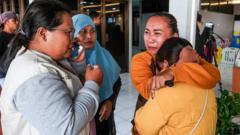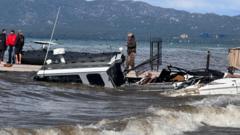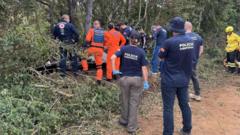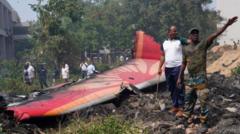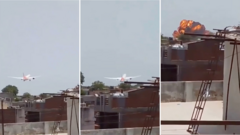A small plane crash in the remote Amazonas area of Bolivia led to an extraordinary rescue operation, where five passengers survived atop the aircraft amid a threat from alligators.
**Survivors Rescued from Alligator-Infested Swamp After Plane Crash**
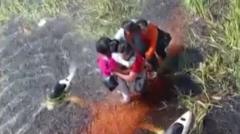
**Survivors Rescued from Alligator-Infested Swamp After Plane Crash**
Five individuals endure a harrowing 36-hour ordeal after emergency landing in Bolivia’s Amazon.
In a remarkable story of survival, five individuals were rescued after enduring a harrowing 36 hours in an alligator-infested swamp following a plane crash in the Amazonas region of Bolivia. The small aircraft, which had been on an emergency landing from Baures to Trinidad, was located by local fishermen after being missing for 48 hours. The survivors, including three women, a child, and the 29-year-old pilot, were reportedly in "excellent condition," according to Wilson Avila, the director of the Beni Department's emergency operations center.
The incident unfolded when the plane began suffering engine failure, prompting pilot Andres Velarde to make an emergency landing near the Itanomas River. He recounted the terrifying experience of standing on top of the plane, surrounded by alligators, which came dangerously close at times. Remarkably, Velarde attributed their safe passage to a leak of fuel from the aircraft that kept the predators at bay; they even spotted an anaconda in the murky waters.
With limited resources, the group resorted to consuming local cassava flour carried by one of the passengers while they awaited rescue. Velarde noted the perilous situation: "We couldn't drink water and we couldn't go anywhere else because of the alligators."
Following the discovery of the plane by fishermen, authorities dispatched a helicopter for immediate evacuation to hospital. In reflecting on the incident, Ruben Torres, Director of the Beni Region Health Department, expressed gratitude towards the collective efforts of various organizations that contributed to the successful rescue operation, dispelling numerous theories that had arisen during the ordeal.
The Amazon rainforest, known for its rich biodiversity, continues to pose significant challenges and dangers for those navigating its terrain, as evidenced by this incident involving caimans, relatives of alligators. The successful rescue not only highlights the resilience of the human spirit but also underscores the critical importance of swift emergency response in remote areas.
The incident unfolded when the plane began suffering engine failure, prompting pilot Andres Velarde to make an emergency landing near the Itanomas River. He recounted the terrifying experience of standing on top of the plane, surrounded by alligators, which came dangerously close at times. Remarkably, Velarde attributed their safe passage to a leak of fuel from the aircraft that kept the predators at bay; they even spotted an anaconda in the murky waters.
With limited resources, the group resorted to consuming local cassava flour carried by one of the passengers while they awaited rescue. Velarde noted the perilous situation: "We couldn't drink water and we couldn't go anywhere else because of the alligators."
Following the discovery of the plane by fishermen, authorities dispatched a helicopter for immediate evacuation to hospital. In reflecting on the incident, Ruben Torres, Director of the Beni Region Health Department, expressed gratitude towards the collective efforts of various organizations that contributed to the successful rescue operation, dispelling numerous theories that had arisen during the ordeal.
The Amazon rainforest, known for its rich biodiversity, continues to pose significant challenges and dangers for those navigating its terrain, as evidenced by this incident involving caimans, relatives of alligators. The successful rescue not only highlights the resilience of the human spirit but also underscores the critical importance of swift emergency response in remote areas.


